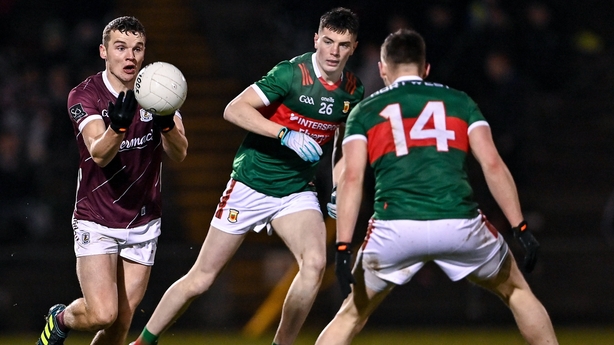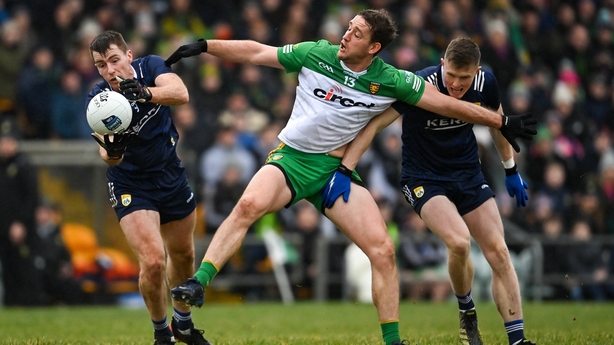Well, the opening weekend of the league succeeded in capturing our attention.
The intensity levels in a lot of the games were off the charts for January football. More so than I've seen for many years.
The Mayo-Galway game, especially. I know it's a derby but it had an air of two teams who set their stall out early to get points on the board.
In the past, your attitude to the league was often dependent on how you finished the previous year.
Under the old system, when the All-Ireland final was in September, you'd arrive into next season with less time to prepare. If you got to the final you'd have a holiday. You'd also have the club season running deep into the winter.
So, there typically was less emphasis on the early rounds of the league. Often you'd only be slipping back in your strongest players by Round 3 or 4.
But now, we've had six months with no inter-county football. And that was very apparent. A lot of teams looked like they had their work done over the course of November and December.
There were plenty of turnovers and mistakes. It was definitely a case of early January blues in terms of skill levels but you'd expect that to be ironed out. What couldn't be faulted was the endeavour and the intensity on display.

One stat that really grabbed my attention came via Ray Boyne, who worked with Dublin in the past, which was the tackle count in Castlebar was nearly double what it was in the Dublin-Kildare game.
Both teams clocked around 90-odd tackles in MacHale Park, Mayo hitting 95 and Galway on 91.
Now, it's only a little barometer. Ground may play a factor in that. You might see the tackle count coming down as the ground gets harder and the games get quicker as we arrive into summer. So that number is probably relatively high compared to a championship figure.
It does measure the level of intensity you're bringing to bear on the game but it is only one metric. And it's also worth noting here that it's very dependent on how you define the tackle - which is a vexed question.
In Mayo-Galway, the middle third was a warzone. Some of the hits that were going in had a championship bite to them. It felt like the two teams who were well primed over the winter, particularly Mayo because they've probably come back from a longer break.
Whatever about the tackle count, ultimately, the key stat I always look at is - wait for it - do you score more than the other team? You can focus on tackles and forcing turnovers, etc. If you're doing all that, it's great. But if you're not putting the ball over the bar, it's not worth a lot.
In Mayo-Galway, the scoring wasn't huge. That probably came down to weather conditions and guys taking the wrong shots. In particular, Mayo.
They will be very happy with the workrate, the intensity, the never-say-die but there will be a lot of emphasis this week on their shooting and their conversion rate because it let them down big time at the weekend.
I was particularly surprised by Galway's intensity. Particularly given they were All-Ireland finalists, I thought they mightn't have been targeting the game in the same way or have as much work done as Mayo.
It just shows Padraic Joyce and Cian O'Neill's mentality. They're taking the year on early. The Maigh Cuilinn influence on the team is huge. The likes of Sean Kelly, Eoin Kelly, Niall Mulcahy, Peter Cooke when he came on, there was a big influence from that contingent.
The big winners across the divisions over the opening weekend were Meath, Roscommon, Clare and Cavan, who'll be delighted to avenge their Tailteann Cup defeat against Westmeath last year. The Rossies would be particularly pleased, especially given their reputation as a yo-yo team in the past half decade.
In Ballybofey, I feared for Donegal early on in that they were getting stripped of possession very easily on numerous occasions. Most dramatically when Dara Moynihan was handed a simple goal early.
But the reaction was very impressive. You could hear in Paddy Carr's voice after the game how proud he was of the team performance and how much they wanted that game. Especially considering the narrative around Donegal following Michael Murphy's departure and the fact that they've been widely tipped as relegation candidates.
Now, it comes with the caveat that Kerry were without the Cliffords, Seanie O'Shea and some of their main guys. But Donegal can only beat what's facing them and the result was vital.
Better again, a couple of new leaders emerged. Dáire O'Baoill at centre-forward kicked two brilliant points. Caolan McColgan - player of the match on the day - I was hugely impressed with his performance, kicking three points from wing-back, including a very, very important score in the first half when Donegal were struggling - albeit Jack O'Connor was aggrieved over that point afterwards.
There's been much talk of Paddy McBrearty inheriting the captaincy. I know Paddy well and that's what he does. He didn't get a lot of shots off during the game - didn't get a score until then - but when the clutch moment came, that was him at his finest.

Division 2 is a minefield at this stage, with big implications for the summer. Obviously, Dublin ground out a win, albeit not comprehensively.
Derry seemed keen to lay down a marker and I was very surprised to see the two boys from Glen, Conor Glass and Ethan Doherty, lining out, particularly given the storyline that's still dragging on over the club final. I know Rory Gallagher praised their mentality but it might hint of a relative lack of depth within their panel that he's recalling the lads so quickly.
Meath looked very impressive. There was a marked change of style with Colm O'Rourke intent on implementing on all-out attacking style. Cork have Kevin Walsh on board and I was intrigued to see how they had set up defensively, but they looked very open at the back.
But one of the biggest games that stood out for me was Clare and Louth. That game was nearly a winner-takes-all for both sides in how the season pans out. They were identified as two teams who might be vulnerable in a very competitive division.
Clare came out with a massive win in the end. Sam Mulroy, who I rate as one of the top forwards, kicking five points, you would think it might have gotten Louth home. But Jamie Malone, always the clutch player, gets the winning score.
Under James Horan, we used to play a challenge game against Clare every year. Because of their honesty and integrity and how they represent Clare, we always got a good test against them.
Their attitude shows just how much respect for their manager and that they really buy into what they're trying to implement. They always get the best of themselves every single year. They're a credit to themselves and their management.
We need your consent to load this rte-player contentWe use rte-player to manage extra content that can set cookies on your device and collect data about your activity. Please review their details and accept them to load the content.Manage Preferences
Listen to the RTÉ GAA Podcast on the RTÉ Radio Player, Apple Podcasts, Spotify, or wherever you get your podcasts.


